九年级英语Unit 2 Robots 1 译林出版社
9BUnit2Robots语言要点(译林牛津版九年级英语下册教案教学设计)

9B Unit 2 Robots 语言要点(译林牛津版九年级英语下册教案教学设计)9B Unit 2 Robots(1)第二单元机器人重点难点1. I’m writing a complaint letter. 我在写一封抱怨信。
★complaint用作不可数名词,意思是“抱怨”“不满”“牢骚”“投诉”。
如:① You have no cause for complaint. 你没有理由来埋怨。
② I’m going to write a letter of complaint. 我打算写封投诉信。
③ There’s no real reason for complaint. 没有真正抱怨的理由。
④ If your neighbors are too noisy, you’ll have cause for complaint.如果你的邻居很吵闹,你就有控告他们的理由。
★complaint用作可数名词,表示“感到不满的事”“抱怨的行动或话语”“投诉”。
如:① My sister wrote me to make so many complaints.我姐姐写信给我,发了那么多的牢骚。
② Some children are full of complaints about their food.一些孩子对他们的食物充满了怨言。
③ I have a number of complaints about the hotel room you’ve given me.我对你们提供给我的旅馆房间有许多不满的意见。
④ The police received several complaints about the noise from our party.警方收到几个不满投诉,说我们的聚会太吵了。
★complain用作动词,意思是“抱怨”“发牢骚”“投诉”,后接抱怨的具体内容时常用介词about或of,在表示“向……抱怨”时,常用介词to,也可接从句。
牛津译林初中九年级下册英语 Unit2 Robots_Main_task_精品课件

very small large
medium √
6.Checking
How often should your robot need to be checked?
never
every 3 months
every 6 months √
7.Lifespan
How long do you expect your robot to last?
First, my robot’s batteries only lasted one week. I think they should last for at least two months. Also, my robot is very lazy. It only works for one hour every day. For the test of the day, my family and I have to do everything ourselves. I think a robot should work at least 12 hours every day.
1 year
10 years
20 years √
Daniel’s expectations
Power
2 months
Work hours
24 hours every day
Type of help him with his work homework
Size
medium
Checking every 6 months
Daniel’s complainarch
receiver’s address Friendly Robots Co Ltd 100 Sun Street Sunshine Town
9BUnit2Robots语言要点(译林牛津版九年级英语上册教案教学设计)
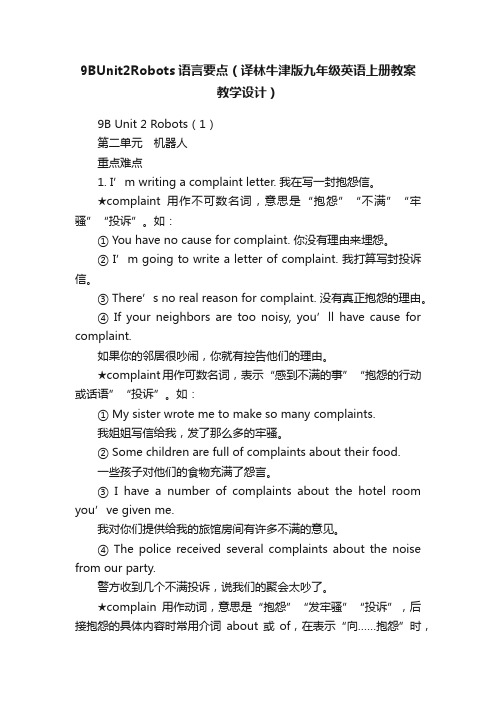
9BUnit2Robots语言要点(译林牛津版九年级英语上册教案教学设计)9B Unit 2 Robots(1)第二单元机器人重点难点1. I’m writing a complaint letter. 我在写一封抱怨信。
★complaint用作不可数名词,意思是“抱怨”“不满”“牢骚”“投诉”。
如:① You have no cause for complaint. 你没有理由来埋怨。
② I’m going to write a letter of complaint. 我打算写封投诉信。
③ There’s no real reason for complaint. 没有真正抱怨的理由。
④ If your neighbors are too noisy, you’ll have cause for complaint.如果你的邻居很吵闹,你就有控告他们的理由。
★complaint用作可数名词,表示“感到不满的事”“抱怨的行动或话语”“投诉”。
如:① My sister wrote me to make so many complaints.我姐姐写信给我,发了那么多的牢骚。
② Some children are full of complaints about their food.一些孩子对他们的食物充满了怨言。
③ I have a number of complaints about the hotel room you’ve given me.我对你们提供给我的旅馆房间有许多不满的意见。
④ The police received several complaints about the noise from our party.警方收到几个不满投诉,说我们的聚会太吵了。
★complain用作动词,意思是“抱怨”“发牢骚”“投诉”,后接抱怨的具体内容时常用介词about或of,在表示“向……抱怨”时,常用介词to,也可接从句。
牛津译林版九年级英语下册Unit2 Robots_Main_task_精品课件

1 year
10 years
20 years √
Reading a complaint letter
Daniel’s expectations
Power
2 months
Work hours
24 hours every day
Type of help him with his work homework
Homework
Write a complaint letter
Suppose you bought a robot from a robot shop, and you are not satisfied with the power, work hours , size , checking lifespan, speaker, wheel , camera, hand (you can choose any of them). You went to the robot shop to complain about it.
Unit2 Main task 参考课件
A complaint letter
Discuss: what is your ideal robot?
1. Would you like a big robot or a small one? 2. What would you like your robot to do for you? 3.How long would you like your robot to work every day ? 4. How long do you think the robot’s batteries should last
Unless you reply with an explanation to all of these problems, I will return the robot to you and expect my money back.
牛津译林版九年级下 Unit2 Robots Reading 课件概要1
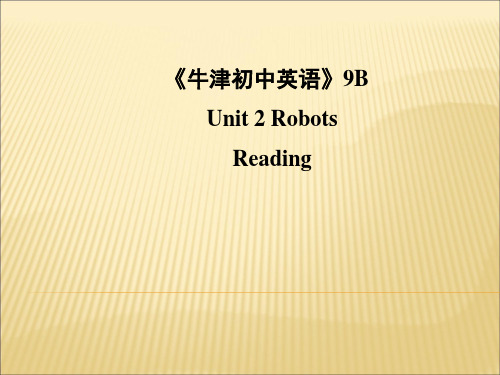
He is a salesman.
Why did he buy a robot?
In order to have more spare time.
Read Paragraphs 3& 5and fill in the form
In the morning
《牛津初中英语》9B Unit 2 Robots Reading
Oral English Test 1
Reading passage:12
This year’s Beijing Music Awards will be covered live. The presentation will be held in Beijing this coming Saturday. All the big pop stars will attend. Before the awards start, we will interview some of the most famous stars. Two thousand fans have voted online for their favourite songs, singers and music videos. The results will be announced during the programme and the host will ask questions for the viewers to answers and send text messages to 1396. If you are lucky enough, you could win two free concert tickets.
牛津译林英语九年级下Unit 2 Robots教案
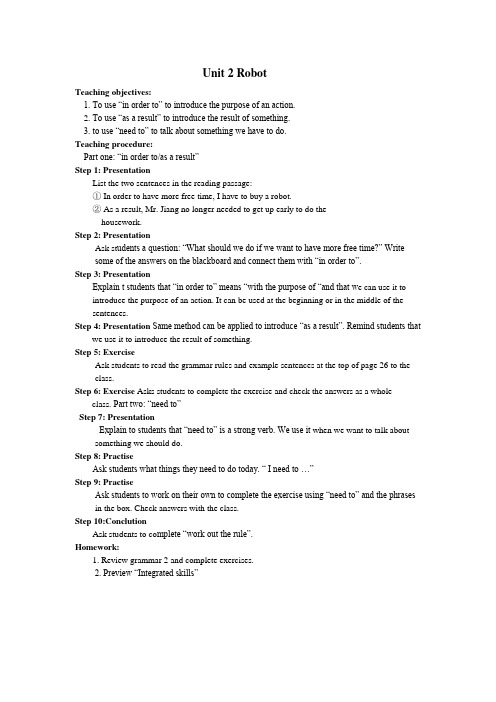
Unit 2 RobotTeaching objectives:1. To use “in order to” to introduce the purpose of an action.2. To use “as a result” to introduce the result of something.3. to use “need to” to talk about something we have to do.Teaching procedure:Part one: “in order to/as a result”Step 1:PresentationList the two sentences in the reading passage:① In order to have more free time, I have to buy a robot.② As a result, Mr. Jiang no longer needed to get up early to do thehousework.Step 2:PresentationAsk st udents a question: “What should we do if we want to have more free time?” Writesome of the answers on the blackboard and connect them with “in order to”.Step 3: PresentationExplain t students that “in order to” means “with the purpose of “and that w e can use it to introduce the purpose of an action. It can be used at the beginning or in the middle of the sentences.Step 4: Presentation Same method can be applied to introduce “as a result”. Remind students that we use it to introduce the result of something.Step 5: ExerciseAsk students to read the grammar rules and example sentences at the top of page 26 to the class.Step 6:Exercise Asks students to complete the exercise and check the answers as a whole class. Part two: “need to”Step 7: PresentationExplain to students that “need to” is a strong verb. We use it when we want to talk about something we should do.Step 8: PractiseAsk students what things they need to do today. “ I need to …”Step 9: PractiseAsk students to work on their own to complete the exercise using “need to” and the phrases in the box. Check answers with the class.Step 10:ConclutionAsk students to co mplete “work out the rule”.Homework:1. Review grammar 2 and complete exercises.2. Preview “Integrated skills”。
牛津译林版 英语课件:九年级下Unit2 Robot
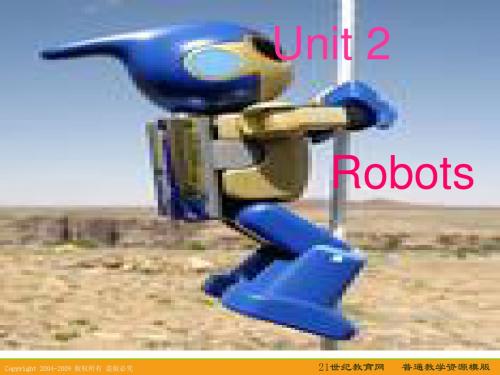
&. 最近的邮局在哪儿?
Where is the nearest post office ?
What are you doing, Eddie ?
I’m writing a complaint letter.
Oh, dear ! I can explain !
Copyright 2004-2009 版权所有 盗版必究
cook dinner
do the laundry
n. 付洗衣物;洗衣店
Copyright 2004-2009 版权所有 盗版必究
做洗衣活
iron shirts
vt. 熨烫
Copyright 2004-2009 版权所有 盗版必究
熨衬衫
Copyright 2004-2009 版权所有 盗版必究
his master ----- Eddie
Copyright 2004-2009 版权所有 盗版必究
Answer the questions:
• Why is Eddie writing a complaint letter ?
Because Hobo is too lazy. He needs to complain to the robot shop.
complaint letter. Jim is going to write a __________
2. I don’t know when I’ll post the letter for you.
我不知道什么时候给你寄这封信。
(1)此句是由特殊疑问词引导的宾语从句。我们还可以用特殊疑问词等来引 导宾语从句,但要注意从句要用陈述句语序。如
牛津译林版英语九下《Unit 2 Robot》(Reading)word教案

Unit 2 RobotReading第一部分简要提示一、年级:九年级二、教学内容:9B Unit 2 Robots三、课型:阅读课四、教学目标1. 知识目标1) 词汇:掌握本课时的四会单词。
2) 词组:to own a robot; change one’s life; in many ways; have more spare time; make a great difference to …; iron shirts; for an extra hour; do the la undry; air the rooms; return home from work; look as good as new; be happy with …; go wrong; catch a virus; cause problems; knock things over; in a mess;3) 句型:In order to have more spare time, I need to buy a robot.As a result, Mr Jiang no longer needed to get up early to do the housework.I need to buy a robot.2. 能力目标通过阅读了解文中所出现的家用机器人的基本情况;学会运用本课所学的主要词汇、句型。
3. 情感目标结合所学内容,引导学生对未来生活展开美好想象,激发学生探索未知世界的热情。
五、教学重难点1. 重点:理解课文内容;掌握四会单词、词组和句型2. 难点:When Mr Jiang got home, he would find his flat in a mess.Coins were spread all over the floor.第二部分教学流程Step 1 Pre-readingT: Hello, everyone! Nice to meet you. I’m Mr. Bao from Wuxi Big Bridge Experimental High School. Look at the picture of my school.T: Is the teaching building tall? It has 12 floors. It may be the tallest teaching building in Jiangsu. Do you know why we built such a tall building? Because the school is close to the city center and we don’t have much space.T: Near the school, there are many shops. Many teachers love going shopping at lunchtime. I don’t like shopping much, but I often go to one of the shops. Can you guess what kind of shop it is?T: Yes, you are right. I often go to the electrical shop. I love to have a look at those TVs, cameras, MP3 players and so on. Last week, I went there again and saw a strange thing. Let’s have a look. T: Do you know what it is? It’s a robot. Do you know what it can help us do? It can help us sweep the floor. Do you like it? Yes? It may help you a lot, but it may also bring you much trouble. You don’t believe that? Today we are going to learn about Mr. Jiang’s robot. Let’s find out how the robot change his life. Before we start to read the article, let’s have a look at these new words.T: Here we have seven new words. Can you match them with the meanings on the right? No. 1, salesman. What does it mean? Yes, it means a man who sells things. No. 2, spare. Yes. Spare means free. For example, spare time, it means free time. No. 3, iron. It means ‘make clothes smooth with an ir on’. No. 4, laundry. What does it mean? Yes. It means the process of washing clothes. We often say do the laundry, which means do the washing. No. 5, virus. It’s something that causes computer problems. No. 6, mess. Mess means a dirty and untidy condition. We often say ‘in a mess’. No. 7, spread. It means covered a large area.T: Now, please read these new words after me.Step 2 While-readingT: V ery good. Now would you please listen to the article on the tape for the main idea? Please listen and answer these two questions.1 Did the robot make a great difference to Mr Jiang’s everyday life?2 What did Mr Jiang decide to do i n the end?T: Let’s check your answers.1 Did the robot make a great difference to Mr Jiang’s everyday life?Yes, it did.2 What did Mr Jiang decide to do in the end?He decided to return the robot to the robot shop.T: Well done! Now, please open your books at Page 24. Please read Paragraph 1 and 2, and then answer these two questions.1. What’s Mr Jiang’s job? (He is a salesman.)2. Why did he decide to buy a robot for himself? (He bought the robot in order to have more spare time.)T: Have you got the answers right? Good! Let’s go on reading. This time, let’s read Paragraph 3, 4 and 5, and then fill in the form below.T: In the morning, the robot makes the breakfast, irons his shirts, makes a lunch box. Mr Jiang can stay in bed for an extra hour. During the day, the robot cleans the flat, does the laundry, washes the dishes, sweeps the floor, makes the bed, airs the rooms, and goes shopping at the supermarket. Mr Jiang is working during the day. In the evening, the robot cooks the dinner and washes the dishes. Mr Jiang relaxes and watches his favourite TV programme.T: Very good! You’ve got all the answe rs right. These are all the good points of the robot. Does it have any bad points? Does he ever do anything wrong? Now, please finish reading the last two paragraphs, and then choose the wrong things that the robot did after he caught a virus.l He cooked breakfast at the right time.l He woke up Mr Jiang at the wrong time.(√)l He threw Mr Jiang’s breakfast into the dustbin.l He threw Mr Jiang’s clean shirts into the dustbin. (√)l He moved around the house and knocked things over. (√)l He went out and often lost his way home.l He made a mess in Mr Jiang’s flat. (√)Step 3 Post-readingT: A ll right. Now, we have known that the robot has some good points and some bad points. Daniel is thinking of the good and bad points of having a robot too. Help him complete the lists below. You have the lists on Page 26 in your books.T: Have you finished? Let’s check the answers together.Good points1 I will have a lot more spare time.2 I can stay in bed/sleep for a bit longer in the morning.3 It can help Mum do the laundry/washing when there are dirty clothes.4 It can iron my shirts after they are washed.5 It can wash the dishes after dinner.6 My flat will be as clean as new.Bad points1 If the robot catches a virus, it will cause a lot of problems.2 I t might put my b reakfast in the washing machine.3 It might even throw my shirts into the dustbin along with the rubbish.4 It might knock things over.5 It might make a mess in my flat.6 I might have to send it back to the robot shop.T: So now Daniel has known about the good points and bad points of the robot. Do you think he will buy a robot? He’s now talking with Millie on the phone. Millie is asking Daniel what it would be like to live with a robot. Here’s their dialogue. Write a T if Daniel’s answer is true. Write an F if it is false.T: Would you read the dialogue in groups? Boys will be Daniel and girls will be Millie.T: Let’s look at Daniel’s answers. No. 1, “Yes.”. It’s false. Do you know why? Because Mr Jiang is the first person in Sunshine Town to own a robot. No. 2, “Maybe. Some changes are good, b ut so me are not. It’s true. No. 3, “From the supermarket.” It’s false Why? Because he can buy a robot from a robot shop, not the supermarket. No. 4, “They want to have more spare time.” Yes, it’s true. No. 5, “It can eat my breakfast for me.” It’s false. Becaus e it can cook breakfast for me, not eat it for me. No. 6, “Yes, I can sleep until noon every day.” It’s false. Because he can sleep for an extra hour in the morning. No. 7, “ It’ll do the housework.” Yes, it’s true. No. 8, “I’m afraid it can’t. It’s false. Because the robot can cook. No. 9, “No. Robots never go wrong.” It’s false. Because sometimes it can go wrong if it catches viruses. No. 10, “I can return it to the shop.” It’s true.Step 4 Language pointsT: Today we’ve learned a lot about robots. So d o you want to buy one? I have got one here. It will teach you some important language points.T: 1. In order to have more spare time, I need to buy a robot. 为了有更多的空余时间,我需要买一个机器人。
最新牛津译林版九年级英语下册Unit2 Robots_Main_task_精品课件

Dear Sir/Madam
Байду номын сангаас
subject Robot model No. HUGO123BB main body
Two weeks ago, I bought a robot from your company in order to have more spare time. ………………………………………… ………………………….. Therefore, I would like to get my money back.
2.Tell them what it should be like. e.g. I think it should last for … I expect … to last for …
3.Tell them your requirement.
e.g. Therefore, I would like to get my money back.
Daniel’s complaint letter
date
22nd March
receiver’s address Friendly Robots Co Ltd 100 Sun Street Sunshine Town
greetings
sender’s address
Rm 702, Happy House 155 Summer Road Sunshine Town
closing Yours faithfully signature
Daniel Chen
One possible version
19th March
85 Planet Road Sunshine Town
Customer Services Action Robots 18 Moon Street Sunshine Town
九年级英语下册:Unit 2 Robot语言知识点归纳(译林牛津版)
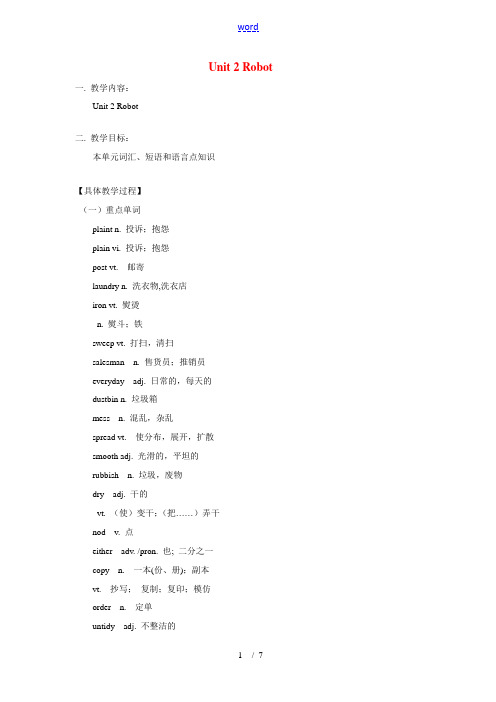
Unit 2 Robot 一. 教学内容:Unit 2 Robot二. 教学目标:本单元词汇、短语和语言点知识【具体教学过程】(一)重点单词plaint n. 投诉;抱怨plain vi. 投诉;抱怨post vt. 邮寄laundry n. 洗衣物,洗衣店iron vt. 熨烫n. 熨斗;铁sweep vt. 打扫,清扫salesman n. 售货员;推销员everyday adj. 日常的,每天的dustbin n. 垃圾箱mess n. 混乱,杂乱spread vt. 使分布,展开,扩散smooth adj. 光滑的,平坦的rubbish n. 垃圾,废物dry adj. 干的vt. (使)变干;(把……)弄干nod v. 点either adv. /pron. 也; 二分之一copy n. 一本(份、册);副本vt. 抄写;复制;复印;模仿order n. 定单untidy adj. 不整洁的巩固练习:在下列句子中填上适当的词使句意完整。
1. Mr. Jiang is a _________________ and works in Moonlight Town.2. The robot ____________________ Mr. Jiang’s shirts yesterday.3. The robot would do the _______________________ for Mr. Jiang.4. A few weeks later the robot caught a ______________________.5. The robot threw the clean shirts in the ____________________.6. Sometimes the robot would ___________________ things over.7. Mr. Jiang found his flat in a ____________________.8. Having a robot was just too much _____________________.9. He ____________________ to me with a smile and said, “Hi!”.10. I haven’t been to Beijing, Tom hasn’t been to Beijing, ______________________.(二)重点短语:1. 在很多方面in many ways2. 为了做某事in order to do sth.3. 使蒋的生活更容易了make Jiang’s life much easier4. 为蒋烫衬衫iron Jiang’s shirts5. 为蒋准备午餐盒make a lunch box for Jiang6. 结果as a result7. 不再no longer/not any longer8. 需要早起need to get up early9. 在上班be at work10. 洗盘子wash the dishes11. 整理床make the bed12. 下班回家return home from work13. 跟新的一样干净be as clean as new14. 准备好be/get ready for15. 对……很满意be happy/satisfied with …16. 染上病毒catch a virus17. 把……返还回机器人商店return sth. to the robot shop18. 叫醒蒋wake Jiang up19. 四处转move around20. 撞翻东西knock things over(三)语言点知识:1. Mr. Jiang is the first person in Sunshine Town to own a robot. (L.2)①own 用作及物动词,表示“拥有”的意思他拥有这辆车。
牛津译林版九年级英语下册Unit2 Robots_Main_task_精品课件
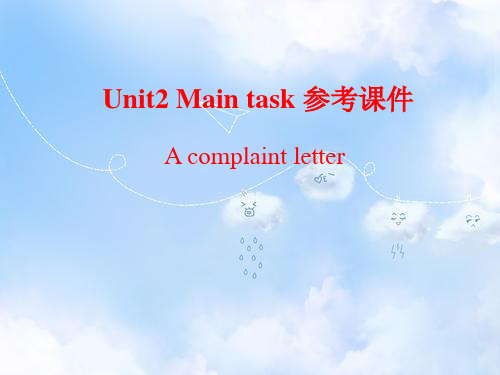
First, my robot’s batteries only lasted one week. I think they should last for at least two months. Also, my robot is very lazy. It only works for one hour every day. For the test of the day, my family and I have to do everything ourselves. I think a robot should work at least 12 hours every day.
2.Power
Your robot’s batteries should last for:
2 days 1 week
2 months √
3.Work hours Your robot should work for:
8 hours every day 12 hours every day
24 hours every day √
closing Yours faithfully signature
Daniel Chen
One possible version
19th March
85 Planet Road Sunshine Town
Customer Services Action Robots 18 Moon Street Sunshine Town
Dear Sir/Madam Robot model No. MAID2030 I have recently bought a robot from your company. However, I am sorry to say that I have had a lot of problems with this robot. I think you really need to improve the performance of your robots.
译林版初三英语Unit2 Robots1

译林版初三英语Unit2 Robots1(答题时间:30分钟)一、根据句意和中文提示写出英语单词:1. The shop has received many ________ (投诉) letters.2. My computer caught a ______ (病毒) and it didn’t work.3. When I got home yesterday, I found my room in a ______ (混乱).4. My mother is ______ (熨烫) shirts for my father.5. Who washes the ______ (餐具) in your family?6. Do you often do the _______ (洗衣服) at weekends?7. My robot will use solar ______ (电池) to absorb energy from the sun.8. Can Mr. Jiang tell me when the robot ______ (烧) breakfast?9. This robot uses his two eyes to take ______ (照片) of everything it sees.10. Would you like to see the car ______ (展览) with me?二、句型转换,将两句合并成一句:1. How did he get here?He asked me ______________________________________________2. What will happen in 100 years?My old grandpa wanted to know ________________________________________3. Who do you want to help?Can you tell me ______________________________________4. Why is Tom often late for school?I don’t know ___________________________________________5. What can I do with the robot?He asked me ____________________________________________三、完成下列句子:1. 那些孩子正在向老师诉苦。
牛津译林版英语九下《Unit 2 Robot》(Integrated skills)
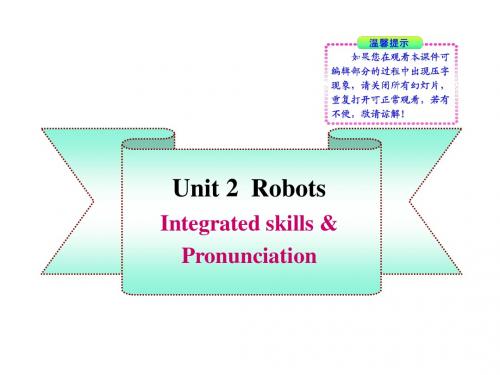
conversation as a model.
Daniel : That robot made in Japan is very interesting, I
think.
Simon : Why?
Daniel : Because it’s designed to do housework.
Simon : What kinds of housework can it do? Daniel : It can sweep the floor and iron clothes. Also, it can cook any kind of food. Simon : That sounds good. Does it get tired?
2. Where will the exhibition be held?
At the Sunshine Town Exhibition Centre. 3. What time does the exhibition open and close? It opens at 10a.m.and closes at 4:30p.m.
_____________ minutes and is designed to
__________________. That is really exciting news! We must go and find out more.
Will you be free this Saturday, 12th March? The exhibition will be open at __________. Maybe we need to leave home around 9 a.m. in order to arrive there on
- 1、下载文档前请自行甄别文档内容的完整性,平台不提供额外的编辑、内容补充、找答案等附加服务。
- 2、"仅部分预览"的文档,不可在线预览部分如存在完整性等问题,可反馈申请退款(可完整预览的文档不适用该条件!)。
- 3、如文档侵犯您的权益,请联系客服反馈,我们会尽快为您处理(人工客服工作时间:9:00-18:30)。
九年级英语Unit 2 Robots (1) 译林出版社【本讲教育信息】一. 教学内容:Unit 2 Robots (1)Main task:Write a letter to the robot shop to complain about your robot. Tasks:1. Use object clauses introduced by ‘wh-’ words.2. Use ‘in order to’ to introduce the purpose of an action.二. 重点、难点:Comic Strips1. I’m writing a complaint letter.write a complaint letter 写一封投诉信complaint n. 投诉、抱怨complain v. 抱怨、埋怨e.g. I need to complain to the robot shop.complain about 抱怨关于……e.g. Don’t complain about others.People are always complaining about the weather.2. I don’t know when I’ll post the letter for you.post v. 邮寄、寄; post… for…为…邮寄e.g. Please post the letter for me, as I am too busy to go out.The card was posted in London a week ago.Welcome to the unit1. iron shirts 熨衣服2. make the bed 整理床铺3. wash the dishes 洗餐具注意:dish 常用复数形式4. do the laundry 洗衣服,相当于 do the washing-up。
5. explore dangerous places 探察危险的地方6. like the sea and outer space 像大海和外太空,注意:sea 前要加the。
Reading1. Mr. Jiang is the first person to own a robot.to own a robot 是不定式短语做定语,修饰 person。
e.g. He is always the first to arrive.2. In order to have more free time, I have to buy a robot.in order to 为了……,后加动词原形,表示目的。
e.g. In order to live, I must eat.He got up early in order to catch the early bus.3. The robot made Mr. Jiang’s life much easier.make + 宾语+ 形容词做宾语补足语e.g. We must make our classroom clean and tidy.His words made me sad.4. The robot ironed Mr. Jiang’s shirts and made a lunch box for him every day.iron 动词,熨烫。
iron 也可以做名词,表示“熨斗,铁”Make a lunch box for him. 为他准备午餐盒。
5. As a result, Mr. Jiang no longer needed to get up early to do the housework and he could stay in bed for an extra hour. 结果,姜先生不再需要早起做家务,他可以在床上多呆一个小时。
no longer 不再,相当于 not any longer 上句也可写成:…Mr. Jiang did not need to get up early to do the housework any longer and he …. an extra hour = one more hour = another hour 表示“在原来的基础上再加一小时”。
6. While Mr. Jiang was at work, the robot would clean his flat. 当姜先生在工作的时候,机器人就在打扫他的公寓。
be at work = be working 在工作,在上班e.g. My father is at work at his office.7. A delicious dinner would be ready for him on the table.be ready for sb. / sth. 为某人/某事做好准备。
e.g. He is ready for the party.be ready to do sth. 准备做某事e.g. They are ready to share things with others.8. Mr. Jiang was very happy with his robot.be happy with sb. / sth. 对某人/某事感到满意。
e.g. She is not happy with her present job.I am very happy with what you have done.类似的短语还有 be satisfied / pleased with sb. /sth.9. A few days later, things started to go wrong. 几周后,事情开始变糟。
go wrong 走错路,发生故障e.g. He had gone wrong and made many mistakes.My computer has gone wrong. It doesn’t work.10. Mr. Jiang did not know what he should do with the robot.do with 与what 连用,表示“对待、处理”,表示“怎样处理某事”要说“what… do with…”,不说“how… do with…”。
e.g. I don’t know what to do with the rubbish.What have you done with the milk?11. The robot was just too much trouble. 机器人真是太麻烦了。
too much“太多”,修饰不可数名词或动词;e.g. too much time; too much money; eat too muchtoo many “太多”,修饰可数名词的复数形式。
e.g. too many books; too many peoplemuch too “太”,修饰形容词或副词。
e.g. much too expensive; much too late12. Will a robot bring any bad changes to your life? (p.23) 机器人将给你的生活带来坏的变化吗?bring sb. sth. = bring sth. to sb. “给某人带来某物”take sb. sth. = take sth. to sb. “把某物带给某人”e.g. SARS brought a lot of trouble to the Chinese.Please take the book to the teachers.13. What can you do if you decide that having a robot is too much trouble?如果你确定拥有一个机器人太麻烦,你该怎么办?that having a robot is too much trouble 为宾语从句,做decide的宾语。
having a robot 在宾语从句中做主语。
e.g. We know that going to bed late is not good for our health.Vocabulary1. My robot is made to look just like a real person. 我的机器人造的像真人一样。
be made 是被动语态,“被制造”。
主动语态应是:I make my robot to look just like a real person.2. The robot uses them to take photos of everything it sees. 机器人用它们拍下它所看到的一切。
it sees 是定语从句,修饰everything3. The robot stands on four small wheels. 机器人靠四个小轮子站着。
on 在这里是“依靠”的意思。
Grammar A BA Object clauses introduced by ‘wh-’ words 由wh- 特殊疑问词引导的宾语从句。
由特殊疑问词作为连接词引导的宾语从句,除连接词外,后面的宾语从句要用陈述句的顺序。
常见的连接词有:who, what, which, where, when, why 等。
e.g. Do you know who is talking over there?Can you tell me what he is?I don’t know when he will come here.I’d like to know why you learn English.We wondered whose book this was.He didn’t know how much money he wanted.B using ‘in order to’ 使用‘in order to’来表示目的in order to ‘以便,为了’,常用来表示做某事的目的,引导目的状语。
e.g. She studies very hard in order to pass the exams.In order to have more free time, I want to buy a robot.in order to 引导的状语如放在句首,与句子的主要部分要用逗号隔开,如把in order to 引导的状语放在句中,则不要加逗号。
